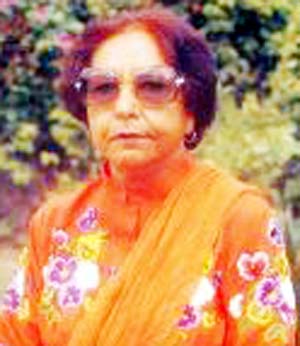Lalit Gupta
The gifted singer whose musical voice echoed the earthly sounds of melody and became synonym with Dogra ethos, Malika Pukhraj, will always remain inextricable part of modern Dogra lore as well as the shared legacy of the sub-continent. Malika Pukhraj was born in 1912, in village Mirpur, on the banks of the River Akhnoor. When she grew up her mother moved to Rajinder Bazaar, Kanak Mandi area of Jammu then known as Urdu Bazaar, where she spent early years of her life. She was given the name “Malika” at birth, by ‘Majzoob’, Baba Roti Ram, a spiritualist, in Akhnoor and named Pukhraj by her Aunt. Since her mother insisted to get her educated, she learnt Urdu and Persian from a distant uncle Gulzar Hussain. As a young prodigy she had melodious voice and started to recite `Nohas’ and `Marsiyas’ from the age of five. She received music lessons in a Delhi sojourn from very strict Ustads. One of her teachers has been quoted as Ustad Mubarik Ali Khan. Ustad Ali Baksh Kasuri, father of Bare Ghulam Ali Khan Sahib also nurtured her. She received training in the classical dance form which complemented Thumri from Ustad Mamman Khan. The opportunity to sing during the coronation ceremony of Maharaja Hari Singh opened a new world for the amateur singer. She was bestowed with the honour of being a court singer at the young age of nine. She remained there for nine years. It is said that she laughed in Maharaja’s Darbar on some funny happening – This being viewed as contempt, she was warned by Janak Singh. Due to some court intrigues she left the Jammu and Kashmir State service. After Partition she moved to Lahore where she gave private recitals and later got associated with Lahore Radio Station. Her natural style of folk singing, distinct and clear style of rendering Ghazals made her a popular star in short time. At the time of partition there were in all four film studio in Pakistan (all at Lahore) including two studios of Dilsukh Pancholi. One of the Pancholi Studios was initially allotted to Afzal Himaliyawala but the allotment was cancelled in 1954 and the same was re-allotted to Malika Pukhraj.(renamed as Malika Studio). She lived in old Lahore City at that time. Shabbir Husain Shah a Government Officer very much liked her singing fell in love with her. They were then married. She continued singing after marriage. She had six children. Malika was considered to be a very harsh teacher of music. One of her daughters, Tahira having learnt singing under her mother’s strict discipline, today is a well known Pakistani singer. Continuing in her style, Tahira has re- sung many of her mother’s famous songs, including her Dogri songs. Malika Pukhraj had visited Jammu for the last time in 1988 along with her daughter Tahira Syed. There was an atmosphere of festivity during her weeklong stay in the city. She also visited the house that was once her’s. Dogri folk songs such as ‘Razi Rohna Ho’,’ Allha Beluaa Ho, Sare Kanne Russi Russi Bohnda Ho’, ‘Pal Pal Bai Jana ho’, ‘Koonjaan Jaii Peiyian Paprole’ ‘Phandu Majooria Naihn-Ho-Lana’, ‘Mana Di Moj’, sung by Malika Pukhraj for their popularity amongst the masses in Jammu region have acquired an iconic status. As her music has an uncanny quality of creating a yearning for things long ago and echo the earthly sounds of the folk music as well as the sophistication of the princely courts. Her inimitable style brought forth a repertoire where poetry and music blended. Hafeez Jalandhari’s Abhi to main jawan hoon (“I am still youthful”) continues to ring with the youth and vitality of her voice. Besides singing Hafeez Jalandhari’s poems, her rendition included Lo phir basant aay and Quli Qutub’s Piya baaj piyale piya jaye na and Faiz Ahmed Faiz’s Mere qatil mere dildar mere paas raho. In her music, she never lost sight of the meaning of poetry and in the flow and ebb of the voice she kept to the dynamics of the couplet. In recognition of her contribution to music, she received the Pakistan’s Presidential Pride of Performance Award in 1980. In 1977, when All India radio, for which she sang until Partition, was celebrating its Golden Jubilee, she was invited to India, and awarded with the ‘legend of Voice’ award. Malika Pukhraj also recorded her memoirs in the novel Song Sung True. According to experts like G.N. Joshi, “Malika Pukhraj’s silvery rich voice and her superb expressive style were ideally suited for rendering romantic ghazals and daadras; she used to present them in such an arresting manner that listeners were at once held spellbound. She displayed rare virtuosity in diverse types of songs for the recordings for gramophone discs and during radio broadcasts. While the ghazals appealed most to the sensuous, her daadras had a unique charm..” Malika Pukhraj died at Islamabad on February 4, 2004, at the age of 90, but her Dogri songs, “nazm” recitations and ghazal renditions live on. She is remembered in the Jammu as a cultural icon and Lahore is still nostalgic with the resonance of her gayaki.


